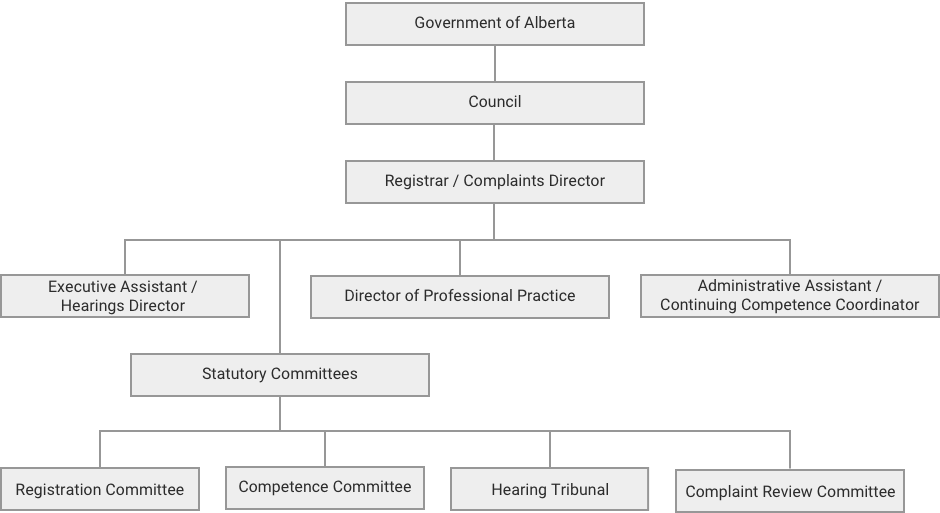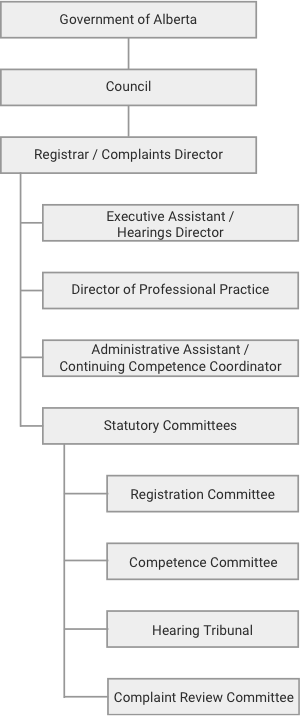Organizational Structure
The organizational structure of the College is established by the roles, relationships and responsibilities defined through the layers of legislation, regulation and bylaws.
To ensure public transparency and accountability, 50% of the council, a Hearing Tribunal, and a Complaint Review Committee are public members appointed by government.
The College of Dietitians of Alberta is governed by a council that consists of Registered Dietitians, Registered Nutritionists and members of the public. 50% of the members of council are regulated members of the dietetic profession.
To ensure that the interests of public protection are central in all activities of a regulatory college, the Health Professions Act states that at least 50% of the voting members of the governing council of a college must be members of the public.
Regulated members of the College who are on the General Register are entitled through appointment to sit on the governing council and College committees and vote in general meetings.
Learn about the different duties and responsibilities by clicking on the squares below.

Council
The council is responsible for the governance and management of the regulatory and business affairs of the College. The council establishes the mission, vision and policy direction for the College. The council also hears appeals referred to it under the Health Professions Act.
The council is comprised of no fewer than five appointed regulated members, including a chair and chair-elect. To increase and maintain public transparency and accountability, the legislation requires that 50% of the council are public members.
Registrar / Complaints Director
The Registrar performs duties designated in legislation, as well as those delegated by the council of the College. The Registrar also serves as Complaints Director. The Complaints Director receives and investigates complaints of unprofessional conduct and determines whether the complaint should be dismissed due to lack of evidence, referred to the Alternate Complaint Resolution process or referred to a hearing.
Executive Assistant / Hearings Director
The Executive Assistant coordinates registration and renewal processes and provides assistance to the Registrar and regulated members. The Executive Assistant also serves as the Hearings Director of the College. The Hearings Director establishes a Hearing Tribunal or a Complaint Review Committee from the list of regulated members appointed by council and coordinates scheduling, production of notices and records for the hearing.
Director of Professional Practice
The Director of Professional Practice is responsible for the professional practice initiatives of the College including the Continuing Competence Program, regulated member communications, workshops, presentations and educational sessions.
Administrative Assistant / Continuing Competence Coordinator
The Administrative Assistant provides general administrative support to College staff. The Continuing Competence Coordinator provides support and coordinates the annual Continuing Competence Program review and audit process.
Registration Committee
The Registration Committee is appointed by council and reviews applications referred by the Registrar. The committee determines whether applicants are eligible for registration and whether any upgrading of academic or practical qualifications is required. The committee also reviews applications for reinstatement of registration that result from disciplinary action.
Competence Committee
The Competence Committee is appointed by council and reviews competence programs referred by the Registrar and determines whether criteria established by council for competence programs have been met or whether any follow up or remedial action is required.
Hearing Tribunal
When a complaint is referred to a Hearing Tribunal, at least two regulated members of the College, and at least two public members appointed by government hear evidence, determine findings and appropriate sanctions.
Complaint Review Committee
Two or more regulated members of the College, along with two or more public members appointed by government, ratify settlements resulting from an Alternate Complaint Resolution Process or to review the dismissal of a complaint if requested by a complainant.

